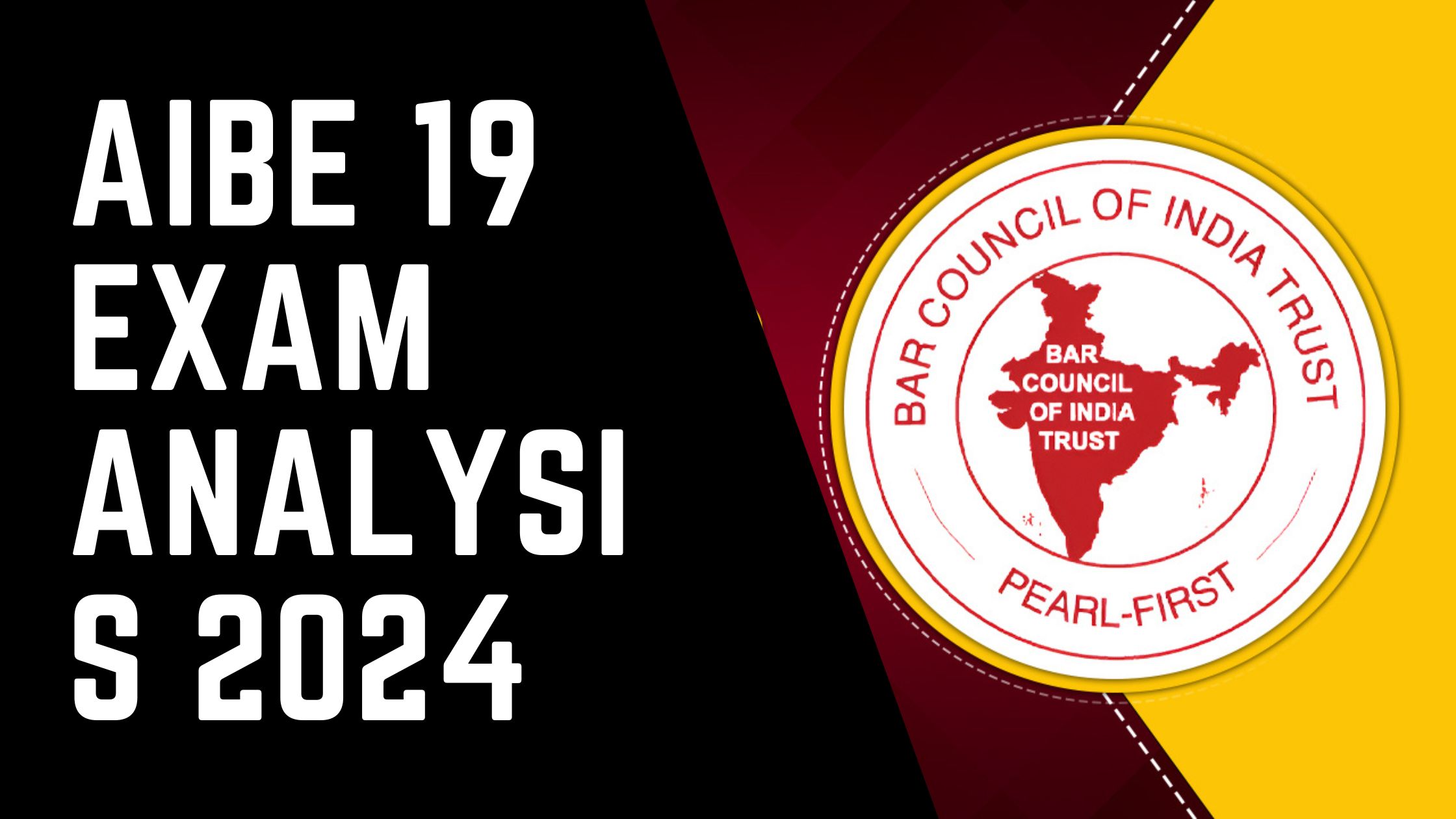The All India Bar Examination (AIBE) is a crucial qualifying exam for law graduates aiming to practice law in India. The AIBE 19 exam, scheduled for Sunday, 22nd December 2024, evaluates a candidate’s legal knowledge and practical skills. While the official analysis will be available after the exam, this article provides a detailed overview of what candidates can expect, based on previous trends and expert insights.
Table of Contents
AIBE 19 Exam Overview
Key Details
| Aspect | Details |
|---|---|
| Exam Name | All India Bar Examination (AIBE) 19 |
| Exam Date | Sunday, 22nd December 2024 |
| Purpose | To assess the legal aptitude of law graduates aiming to practice law |
| Exam Mode | Offline (pen-and-paper) |
| Type of Questions | Multiple-choice questions (MCQs) |
| Total Questions | 100 |
| Total Marks | 100 |
| Duration | 3 hours 30 minutes |
| Language Options | 11 languages, including English and Hindi |
| Key Subjects | Constitutional Law, IPC, CPC, Family Law, Evidence Act, etc. |
| Marking Scheme | No negative marking |
| Passing Marks | General: 40 marks; SC/ST: 35 marks |
The AIBE is not just about theoretical knowledge but focuses on a candidate’s ability to apply legal principles to practical scenarios, ensuring they are equipped for the legal profession.
AIBE 19 Exam Pattern 2024
Understanding the exam pattern is vital for preparation. Here’s a breakdown:
| Particulars | Details |
|---|---|
| Exam Mode | Offline (pen-and-paper) |
| Type of Questions | Objective (MCQs) |
| Total Questions | 100 |
| Exam Duration | 3 hours 30 minutes |
| Marking Scheme | +1 for each correct answer; no negative marking |
| Subjects Covered | 19 law subjects, including Constitutional Law, IPC, CPC, Family Law, etc. |
| Language Options | 11 languages, including English and Hindi |
The exam tests candidates on foundational legal knowledge and practical applications. Key areas include procedural and substantive laws.
Expected AIBE 19 Difficulty Level
Based on previous years’ trends, the AIBE 19 difficulty level is expected to vary across subjects. Here’s a summary:
| Subject/Section | Expected Difficulty | Details |
|---|---|---|
| Constitutional Law | Moderate to Difficult | Conceptual and application-based questions. |
| Criminal Procedure Code | Moderate | Focus on procedural aspects and practical application. |
| Indian Evidence Act | Moderate to Difficult | Emphasis on critical sections and evidence rules. |
| Family Law | Easy to Moderate | Straightforward questions on key provisions. |
| Administrative Law | Moderate | Situational questions testing principles and basic understanding. |
| Overall Difficulty | Moderate | A mix of direct questions and practical application scenarios. |
Candidates must focus on conceptual clarity and practical understanding, particularly in high-weightage subjects like Constitutional Law and Evidence Act.
AIBE 19 Student Reviews
Here are insights shared by students from previous AIBE exams:
- Rohan: Found the exam well-structured but emphasized the importance of time management and practicing mock tests.
- Ananya: Appreciated the option to carry Bare Acts with short notes, which helped answer many questions effectively.
- Kunal: Felt the closed-book format required careful memorization of key sections of Bare Acts. Found Constitutional Law relatively easy but overall challenging.
- Rahul: Skipped bringing Bare Acts but remained optimistic about his performance despite finding the exam tough.
These reviews highlight the importance of thorough preparation, effective use of Bare Acts, and strategic time management.
Good Attempts for AIBE 19
“Good attempts” refer to the number of questions candidates should aim to answer correctly for a strong performance.
| Category | Expected Good Attempts | Remarks |
|---|---|---|
| General Category | 65–70 questions | Strong accuracy and understanding needed for a safe score. |
| Reserved Categories | 60–65 questions | Focus on high-weightage topics to meet the qualifying marks. |
| Overall | Attempt all 100 questions | No negative marking encourages attempting all questions. |
With no negative marking, candidates should maximize their attempts while maintaining accuracy to secure a strong score.
AIBE 19 Expected Cut-Off 2024
The cut-off is the minimum score required to qualify for the AIBE.
| Category | Minimum Passing Marks | Expected Cut-Off Marks 2024 |
|---|---|---|
| General | 45% | 42 marks |
| OBC | 45% | 42 marks |
| SC/ST | 40% | 37 marks |
While the minimum passing marks are consistent, factors like exam difficulty and candidate performance may slightly influence the final cut-off.
Preparation Tips for AIBE 19
- Focus on Bare Acts: Understanding key sections and their practical application is crucial.
- Practice Mock Tests: Simulate exam conditions to improve time management.
- Prioritize High-Weightage Subjects: Pay extra attention to topics like Constitutional Law, IPC, and Evidence Act.
- Leverage Resources: Use concise notes, summaries, and past papers for efficient revision.
- Manage Time: Allocate time wisely to cover all sections during the exam.
The AIBE 19 Exam 2024 is designed to test both theoretical knowledge and practical legal aptitude. With an emphasis on foundational understanding and real-world application, candidates must prepare thoroughly, focusing on high-weightage subjects and efficient time management. The absence of negative marking offers an advantage, but accuracy remains key to success.
By following a structured preparation strategy, candidates can confidently approach the AIBE and secure their qualification to practice law in India.
FAQS
1. What is the date of the AIBE 19 exam in 2024?
The AIBE 19 exam is scheduled for Sunday, 22nd December 2024.
2. What is the mode of the AIBE exam?
The AIBE exam is conducted offline, in a pen-and-paper format.
3. Are there any negative marks in the AIBE exam?
No, the AIBE does not have a negative marking scheme.
4. What are the minimum passing marks for AIBE 19?
- General/OBC: 42 marks
- SC/ST: 37 marks
5. What subjects are covered in the AIBE exam?
Key subjects include Constitutional Law, IPC, CPC, Family Law, Evidence Act, and more.













